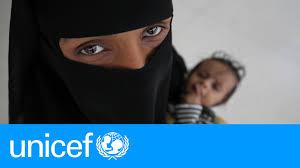
UNICEF and its partners have completed an ambitious drive to reach children and women in Yemen with critical health and nutrition services to save lives as the conflict continues.
The 24-29 September nation-wide campaign reached more than 600,000 children under the age of five and over 180,000 pregnant and breastfeeding mothers with a package of health and nutrition services that include vaccination, vitamin supplementation, deworming, screening for malnutrition and treatment for childhood infections as well as antenatal and postnatal care for women.
Over 34,000 health workers supported by 880 supervisors and monitors spread across Yemen’s 333 districts using over 10,000 vehicles and other means of transportation such motorcycles, donkeys or simply walking long distances on difficult terrains to reach children and women in far flung corners of the country.
“We have increased our geographical reach to all parts of the country as well as increased the number of times we do the integrated outreach. This has resulted in delivering medical assistance to the most hard-to-reach communities especially those most affected by the conflict”, said UNICEF Yemen Representative Julien Harneis.
This health drive comes at a critical time as Yemen’s conflict has left the health and nutrition system in tatters putting the lives of millions of children and women at risk.
“With the health system hanging in the balance, such outreach programmes are helpful but are not sustainable in the long run. Outreach campaigns alone cannot address the medical needs of the population; the health system needs to be back on its feet urgently,” Harneis said.
Recently, the Ministry of Health announced that it has run out of basic operational costs for the primary health care system. This means it won’t be possible to transport medical supplies including medicines from stores to far flung health units; there will be no fuel and electricity for powering refrigerators for storage of temperature-sensitive vaccines and medicines and health centres will have no light.
The numbers of children at risk in Yemen are staggering; 2.5 million children are at risk of diarrhoea, 1.3 million at risk of acute respiratory tract infections and 1.5 million are malnourished, 370,000 of them suffering from severe acute malnutrition.
UNICEF is scaling up its response but the humanitarian needs are enormous. Since January, UNICEF has supported the vaccination of over 4.6 million children against Polio, the treatment of over 133,000 children against severe acute malnutrition and over 168,000 pregnant and breastfeeding mothers received support during and after pregnancy including knowledge on how to care for their babies and of themselves.
Source: UNICEF
 FR
FR EN
EN AR
AR








